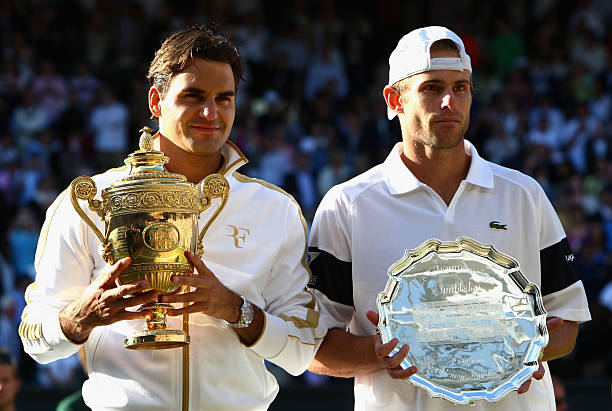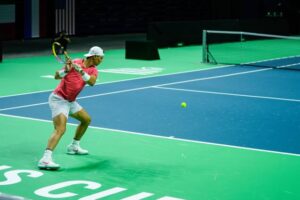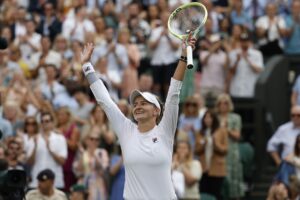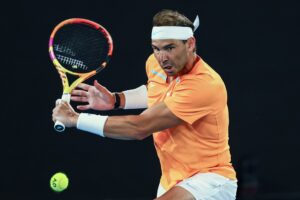Roger Federer changed the game of tennis on the ATP Tour. The standard of tennis that he produced from the mid-noughties and beyond was unlike anything seen before. This then inspired the likes of Rafael Nadal, Novak Djokovic, and Andy Murray to eventually rise up to challenge, and in some cases, surpass the great Swiss. Even the newest star of the tour, Carlos Alcaraz, has spoken of being inspired by Federer.
The Federer Dominance Years
Federer won his first ATP Title in January 2001, over two years before Alcaraz was even born. Though it is difficult to argue that Julien Boutter, the defeated finalist, was denied from going on to great things (Boutter reached #46 in the world and won one title in 2003) there is a whole phalanx of players who Federer repeatedly defeated and denied them from achieving potentially remarkable things in the sport.
Federer won the Australian Open, Wimbledon, and US Open every year between 2004 and 2007 and made every Grand Slam final between 2006 and 2009 bar one semifinal defeat to Jo-Wilfried Tsonga in Australia 2008. Whilst the great man was not able to overcome a young Rafael Nadal in Paris, Federer represented something of a brick wall to other players of his era to achieve Grand Slam or rankings glory.
Andy Roddick
The most obvious player to fall into the “denied glory” category is the big-serving American. Roddick won his first, and as it turned out, only, Grand Slam title at Flushing Meadows in 2003. With Roddick being slightly younger than Federer he then became locked in something of an eternal duel with the Swiss for the rest of his competitive career.
Though Roddick achieved the World #1 ranking in 2003, becoming the youngest American to hold the top ranking at 21, he never saw that ranking again after Federer assumed the mantle in 2004.
Roddick reached five Grand Slam finals, winning that first one in New York against Juan Carlos Ferrero (now coach of Alcaraz) but then losing the remaining four to Roger Federer. One more in New York (2006) and three Wimbledon finals, the last of which, in 2009, was one of the greatest finals of all time with Roddick eventually missing out 16-14 in the fifth set. One wonders whether that defeat broke his heart as he won only one Masters Series title after that and reached no further Major finals.
Roddick retired in 2012, a full decade before Federer, and ended with a 3-21 record against the Swiss. This encapsulates the “rivalry” in a nutshell.
What he could have won: four Wimbledon titles, ten Grand Slam titles, Multiple weeks/years at world #1
Lleyton Hewitt
Hewitt had positioned himself at the top of the game with wins at the US Open and Wimbledon, taking the year-end World #1 ranking in 2001 and 2002. However, Federer proved to be a huge obstacle for Hewitt in subsequent years.
Hewitt probably thought that he had Federer worked out, having won seven of their first nine meetings, but from 2004 onwards Federer won pretty much every time they met on the court. The epitome of the turnaround was in the 2004 US Open final when Federer smashed Hewitt 6-0 7-6 6-0, denying the Australian a second US Open title. Hewitt lost to Federer in five out of the eight Grand Slam tournaments in 2004 and 2005.
Hewitt gradually faded away from the very top of the game but was definitely on course to win more big titles until the Swiss came along.
What he could have won: Two US Open titles, five Grand Slam titles, another crack at #1?
Marat Safin
Safin was arguably just as talented as Federer and was in great position at the top of the game to win some big titles. Federer never gave Safin a look in their matches though. The Swiss won his first Masters title against Safin in 2002 and that set the tone for their “rivalry.”
Federer denied Safin an Australian Open title in 2004, though Safin won his only Grand Slam match against Federer in the following year’s semifinals. Federer beat Safin three more times in Grand Slam play whilst also denying the Russian in the Masters Cup year-end event,
What he could have won: Two Australian Open titles, four Grand Slam titles, Masters Cup title
Denying Cult Heroes
Federer denied a lot of other players good chances of winning more titles, he was 4-1 against Andy Murray in Grand Slams, including three finals, 7-1 vs Stan Wawrinka in Grand Slams (17-0 on hard courts too), and though he was more often on the receiving end against Nadal, especially at Roland Garros, he did deny the Spaniard some Wimbledon titles in return.
However, there are some great storylines and cult heroes that were denied their glory by Federer. Marcos Baghdatis is still a Cypriot hero, but winning the Australian Open in 2006, in front of the sizable Cypriot diaspora, would’ve cemented his place as a history maker for the island nation.
Fernando Gonzalez also had a dream run in Australia in 2007. The Chilean’s pulverizing forehand had taken care of Juan Martin del Potro, James Blake, Lleyton Hewitt, Rafael Nadal, and Tommy Haas on the way to the final. But despite pushing Federer to a tiebreak, the Swiss became the first player since Bjorn Borg to win a Grand Slam title without dropping a set. Clearly, no respect was shown to the poor Chilean tennis fans.
Federer sneaked in one French Open title after Nadal lost to Robin Soderling in 2009. Soderling made the final that year, and although no one could have predicted that the Swede’s career was to be cut short so soon afterward it would’ve been perhaps fitting for the Swede to win at least one French Open title himself. Of course, this would’ve denied Federer the career Grand Slam as well so one wouldn’t want to take it away from him.
Finally, a mention for Andre Agassi. A great from an era just before Federer emerged on the scene, Agassi had fantastic runs at the US Open in 2004 and 2005. A five-set quarterfinal epic over two days went Federer’s way in 2004 and just as it looked as though the American great would round off his career in style with another home Grand Slam title, Federer shut the door on him in the 2005 final after sharing the first two sets.
Main Photo:
Embed from Getty Images





